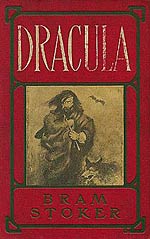
![]() Scott Laz
Scott Laz
12/19/2011
![]()
Dracula is widely praised as a classic by horror fans and critics alike, but I have to wonder if it has become somewhat overrated due to its iconical stature. It was not the first vampire novel, but it is the one that became definitive, and led to the films that made the story (which I'm sure there;s no reason to summarize here!) one of the best known in English literature.
It's still worth reading for anyone interested in the history of fantasy, as well as for its better moments and its interesting structure, but I must admit I found it something of a slog. In part, this is probably because the story is over-familiar at this point, and much of Stoker's suspense-building is based on the slow accretion of information in regard to what is really going on, which would work much better with readers who do not already know the story. As a result, the horror is diluted. The novel is quite long, and the full realization that Dracula is a vampire does not emerge until nearly two-thirds of the way through the book. The first four chapters, detailing Harker's experience at Dracula's castle, are eerie and suspenseful, but once the action shifts back to England and Dracula becomes more of a background presence, things slow considerably, and I became impatient at the slowness of the plot development.
On the positive side, the epistolary approach (the story is told entirely by way of the protagonists' diaries and letters, and a few relevant news clippings) is an interesting way to immerse the reader in the characters' slow realization, by way of accumulating evidence, of the true horror they have become involved in.
Also interesting is the role of science in the novel. Van Helsing is presented as one of the leading medical scientists of the time, and yet he must convince the other characters to accept the supernatural explanation for what is happening. For him, it comes down to keeping an open mind and being willing to accept the empirical evidence. (In fact, one of the narrative frustrations is his refusal to explain to the other characters what he thinks is going on until he is sure they have seen enough to keep them from refusing to believe.) If this leads to superstitions being verified, so be it. He then fights vampirism with whatever works, be it blood transfusions or garlic flowers and crucifixes. I'm not sure how this would have come across to a reader in 1897, but it seems an odd juxtaposition now: the ultimate man of science using Christian symbols to fight off a supernatural menace.
As for the writing, the novel contains much extraneous detail as the characters tell their stories, long speeches that might work in the theater but seem artificial here (Stoker was better known at the time for his plays than for his novels), histrionic sentimentality (the male characters' worship of the feminine perfection of Lucy and Mina gets old quickly), and distracting attempts to phonetically reproduce vernacular speech. I might forgive these problems as artifacts of the time the book was written, if some of the best writing in English had not come from the same period (Mark Twain, Henry James, and Edith Wharton come to mind).
If you are patient enough to wade through a fair amount of this, there are rewards to be had in the novel. If nothing else, those first four chapters are well worth the time, and the book's place is the history of horror and fantasy is well-deserved.